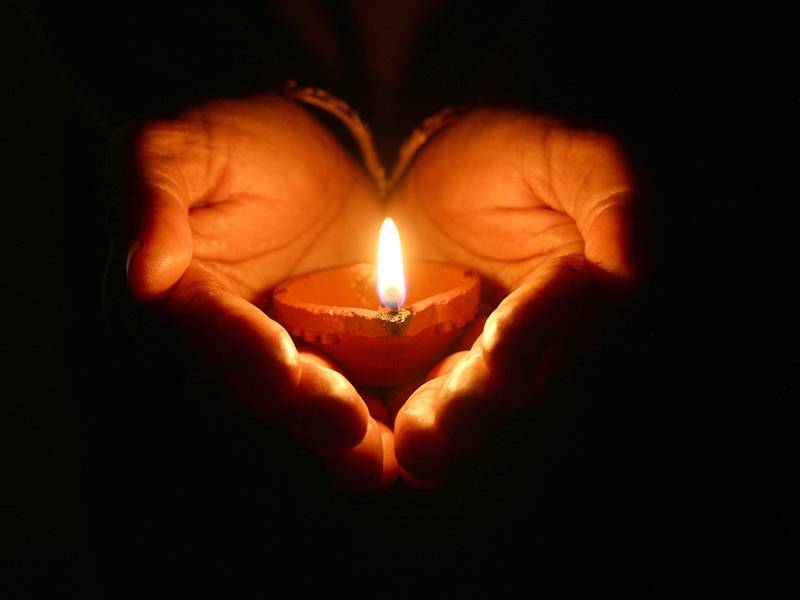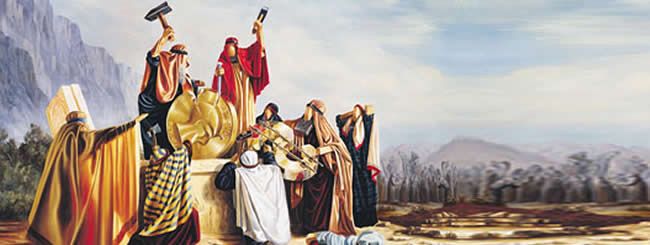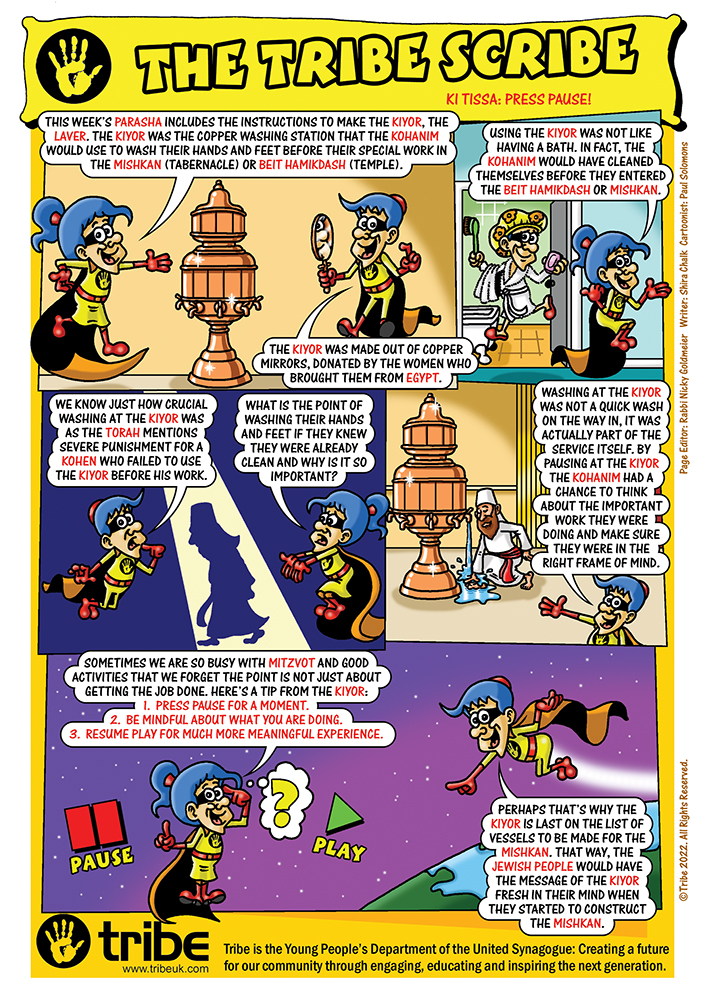Bonjour / Hello [nickname_else_first_name],
Table of contents
1) Perashat Hashavoua - Rabbi Eli Mansour
2) Halakhat Hashavoua (Halakhot related to day to day life) By Hazzan David Azerad -
Shabbat Parashat Parah and the meaning of the Festival of Pesach -Peninei Halacha
3) Holy Jokes!
4) For KIDS

This Week's Parasha Insight with Rabbi Eli Mansour
Parashat VaYakhel: Avoiding “Fire” on Shabbat
Parashat Vayakhel begins with Moshe assembling Beneh Yisrael and conveying to them the command to observe Shabbat, singling out in particular the prohibition against lighting fires on Shabbat: "Do not kindle a fire in any of your residences on the day of Shabbat."
Many commentators raised the question of why this specific prohibition was singled out from among all the many prohibitions that apply on Shabbat. Why did Moshe make particular mention of the prohibition against kindling a fire?
One of the answers that have been suggested is that Moshe actually refers here to the "fire" of anger. He warns us in this Pasuk of the need to avoid anger on Shabbat.
Medically, it has been shown that anger poses grave danger to the human body, and can cause high blood pressure, ulcers and other serious maladies. Spiritually, our Hachamim teach that nothing is more harmful and destructive for the soul than anger. And on Shabbat, we are especially prone to becoming angry. During the week, the family members are busy with their personal schedules and do not have much time to sit with each other, whereas on Shabbat, everyone is together in close quarters for an extended period of time. This offers a beautiful opportunity for bonding and meaningful interaction, but also allows for fighting and arguments. This is true in communal life, as well. The biggest crowd in the synagogue the whole week is, of course, on Shabbat. This is a beautiful opportunity for harmonious congregational prayer and study, but can also create tension and stress which could precipitate fighting. Shabbat thus offers us the opportunity for spiritual greatness, but also poses the risk of spiritual destruction by putting people close together and making them prone to anger.
An even greater threat, though, arises in the hours before Shabbat, on Friday afternoon. Especially in the winter months, when Shabbat begins early Friday afternoon, these hours are a very tense and pressured time. There’s a lot to get done, and people are anxious. And, while I have not conducted a scientific survey on the subject, I would venture to guess that the majority of household problems happen to take place on Friday. It seems like it’s always Friday when the shirt is missing a button or the oven breaks. If we took a survey of community plumbers, I imagine we would hear of a disproportionately large number of leaks, bursts and boiler breakdowns specifically on Fridays. This is the Satan trying to interfere with the beauty and spiritual benefits of Shabbat. He finds ways to get people nervous and agitated which in turn causes them to become angry and shout at one another, so that the family sits down at the table upset, aggravated, and not at all interested in sharing a beautiful Shabbat experience together.
"Do not kindle a flame in any of your residences on the day of Shabbat." We are instructed to do everything we can to avoid this pitfall and make Shabbat the day of peace and serenity that it is supposed to be.
One recommendation is to have everything for Shabbat prepared early on Friday afternoon, well in advance of the onset of Shabbat, to avoid the last minute pressures that can cause a raging "fire" of strife and tension.
The story is told of a couple that was childless for many years, until they finally had a son. Unfortunately, however, the child developed a severe heart condition, and they brought him to the best doctor available, in Vilna. After examining the child, the doctor informed the parents there was nothing he could do. On their way home, somebody advised them to stop off in Radin and receive a blessing from the Hafetz Haim. The great Sage instructed that every week they should have everything for Shabbat prepared and ready at midday on Friday, and they committed to following this instruction. When they brought their child back to the doctor in Vilna, he told them that the child must have received a new heart, because it was fully healed.
If the President of the United States tells us he’s joining us for dinner, we would ensure to have everything perfectly prepared in time. On Friday night, Hashem Himself comes to our homes. It would terribly disrespectful not to have everything ready. Understandably, this could be very difficult during the winter when Shabbat starts very early. But throughout the rest of the year, at very least, we have no excuse for a last-minute rush on Friday afternoon. Friday should not be the time for long leisurely trips and recreational activities. Ereb Shabbat is the time for preparing for our special "Guest," and the earlier we prepare, the calmer we would be so we can avoid the destructive "fire" that, when kindled, can take away all the spiritual treasures that Shabbat offers us.

Halachot this week are selected and Translated by Hazzan David Azerad
Shabbat Parashat Parah and the meaning of the Festival of Pesach -Peninei Halacha
The Sages instituted the public reading of four Torah passages (parshiyot) in addition to the weekly Torah portion: Parashat Shekalim, Parashat Zakhor, Parashat Para, and Parashat Ha-ĥodesh. We read each of the latter three parshiyot on a Shabbat during the month of Adar, while Parashat Shekalim is usually read on the Shabbat before Adar begins.
On this Shabbatot, we take out two Torah scrolls from the ark. First, we read the weekly parsha from the first scroll, dividing it into seven aliyot as on any other Shabbat. Then, we read the special parsha as maftir (the concluding aliya that precedes the haftara) from the second scroll. Since the haftara, which is a section from the Prophets, must relate to the content of the maftir, the haftarot of these weeks all deal with themes connected to the special parsha that was read from the second scroll, not to the weekly portion that was read from the first.
The first 2 of the four parashiyot Parashat Shekalim and parshat Zachor were read already. This coming Shabbat is Parashat Parah, which instructs one how to purify himself from ritual impurity, so that he may enter the Temple and bring offerings. The Sages instituted that it be read as the month of Nisan approaches so that one can prepare and purify himself for the upcoming Pesaĥ offering. Even though we do not bring this offering nowadays, we read Parashat Para in commemoration of the Temple.
The Festival of Matzot and the Festival of Pesaḥ - Peninei Halacha
The holiday of Pesaḥ has two different names in the Torah, corresponding to its two distinct meanings: Ḥag Ha-matzot (the Festival of Matzot), as it is written, “You shall observe the Festival of Matzot (Shemot 23:15 and elsewhere), and Ḥag Ha-Pesaḥ (the Festival of Pesaḥ), as it is written, “the sacrifice of the Festival of Pesaḥ” (Shemot 34:25). Ḥag Ha-matzot represents the revelation of God’s providence, and Ḥag Ha-Pesaḥ represents Israel’s unique spiritual capacity.
In the Exodus from Egypt, God’s sovereignty over the world was given its most apparent and concrete manifestation. Thus, our faith in God is fundamentally rooted in the Exodus. The matza symbolizes this aspect of our holiday, as we read in the Hagada: “This matza that we eat – what is the reason? Because our forefathers’ dough did not have time to rise before the holy Supreme King of kings revealed Himself to them and redeemed them.”
The unique mission and destiny of the people of Israel were also revealed at the time of the Exodus. The distinction between the Israelites and the Egyptians was conspicuous in all the plagues, as the Egyptians were struck and the Israelites were saved, through to the Plague of the Firstborn, when the destroyer struck every Egyptian household but passed over (pasaḥ) Israelite homes. Israel’s uniqueness is expressed through and symbolized by the Paschal sacrifice.
These two fundamental principles – faith and Israel – are linked together and interdependent. Unlike the other nations, which are formed through human endeavor, the nation of Israel was forged through divine miracles and wonders at the time of the Exodus to receive God’s Torah. Israel’s status entirely depends on its connection with God: when Israel does God’s will and makes God’s name manifest in the world, it earns all the blessings promised in the Torah. But when they do not fulfill God’s will, all of the curses written in the Torah are visited upon them.
Correspondingly, the revelation of God’s name in the world, that is, the manifestation of divine values on earth, depends upon Israel, as Scripture states: “I created this nation for My sake; they will tell My praise” (Yeshayahu 43:21). For this reason, the Sages stated (Bereishit Rabba 1:4) that the idea of Israel preceded the creation of the world, for it is through Israel that the purpose of the world is revealed. This is what the Sages meant when they said: “God set a condition with Creation: ‘If Israel accepts the Torah, you will continue to exist, but if not, then I will return you to being formless and void’” (Shabbat 88a). Israel’s unique capabilities were further made manifest in that God chose us to be His nation and children, although we were lowly slaves, stuck in the morass of impurity in Egypt.
Thus, the two biblical names of the holiday express two aspects of one matter, namely, the revelation of God’s name in the world through Israel.
Bevirkat Shabbat Shalom Umevorach
David Azerad
3) HOLY JoKeS!!
Selection of funny snippets, loosely related to this weeks parashah or current events, to brighten your day



4) FOR KIDS
Click on the image to open the youtube video







 MABROOK!!!
MABROOK!!!












